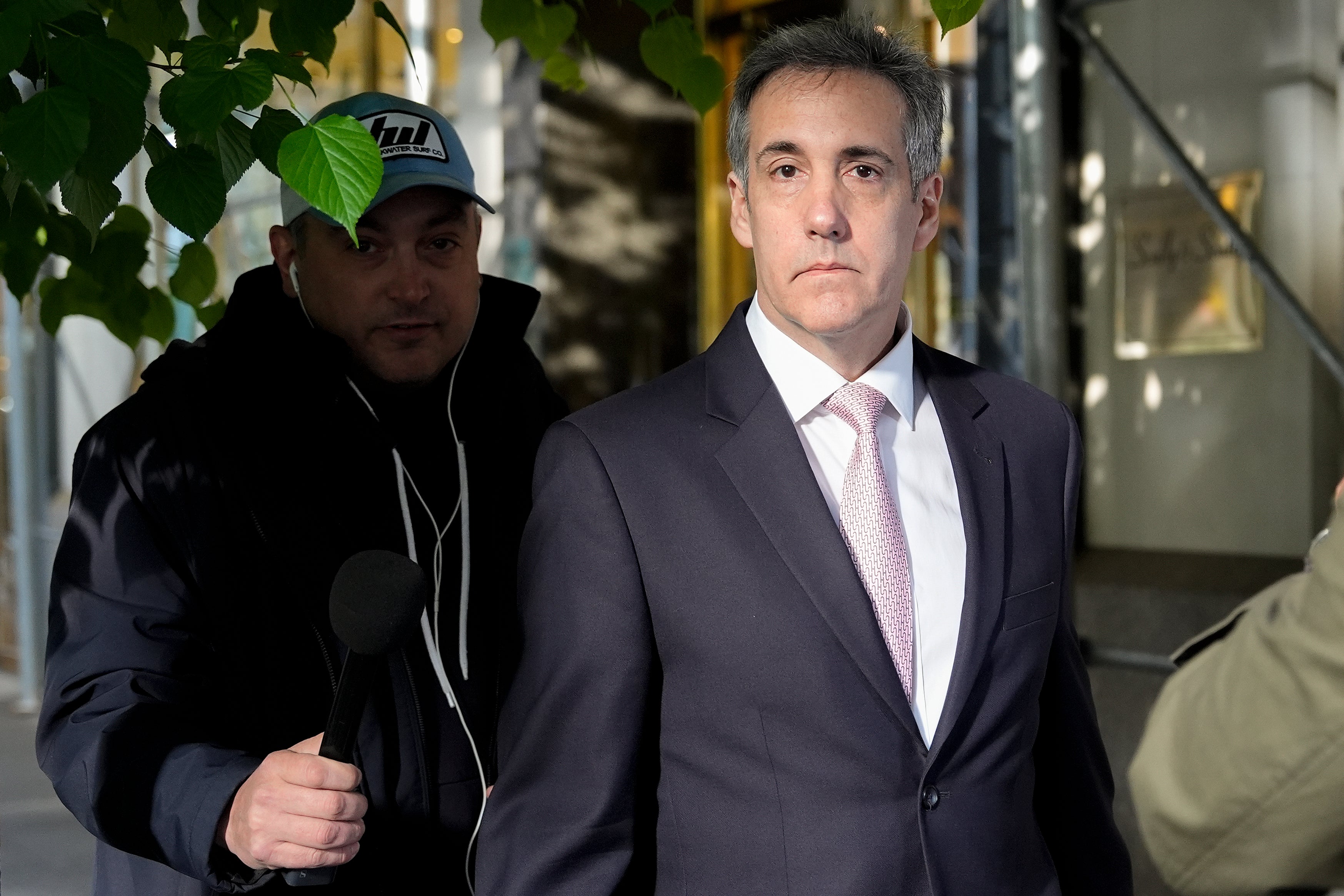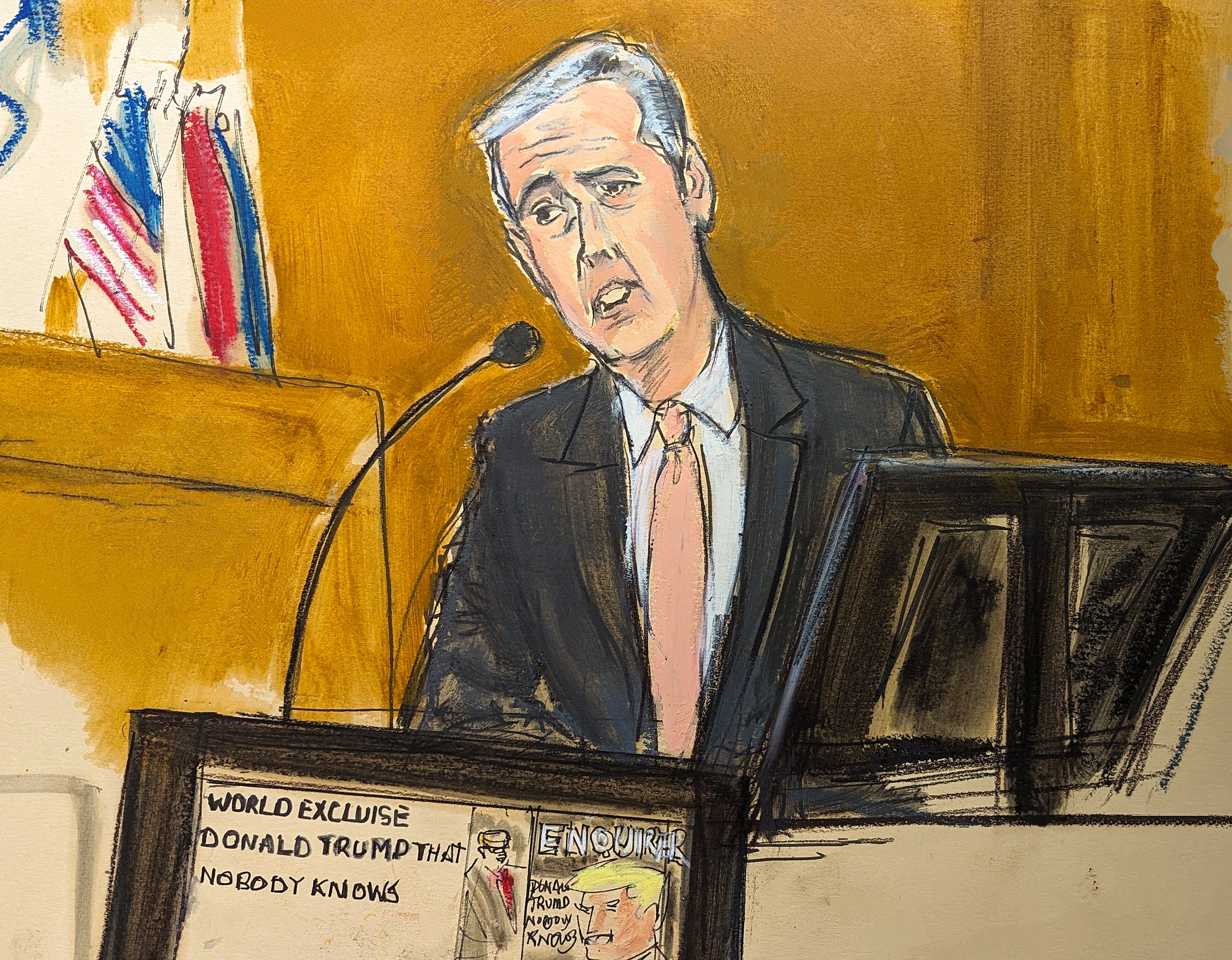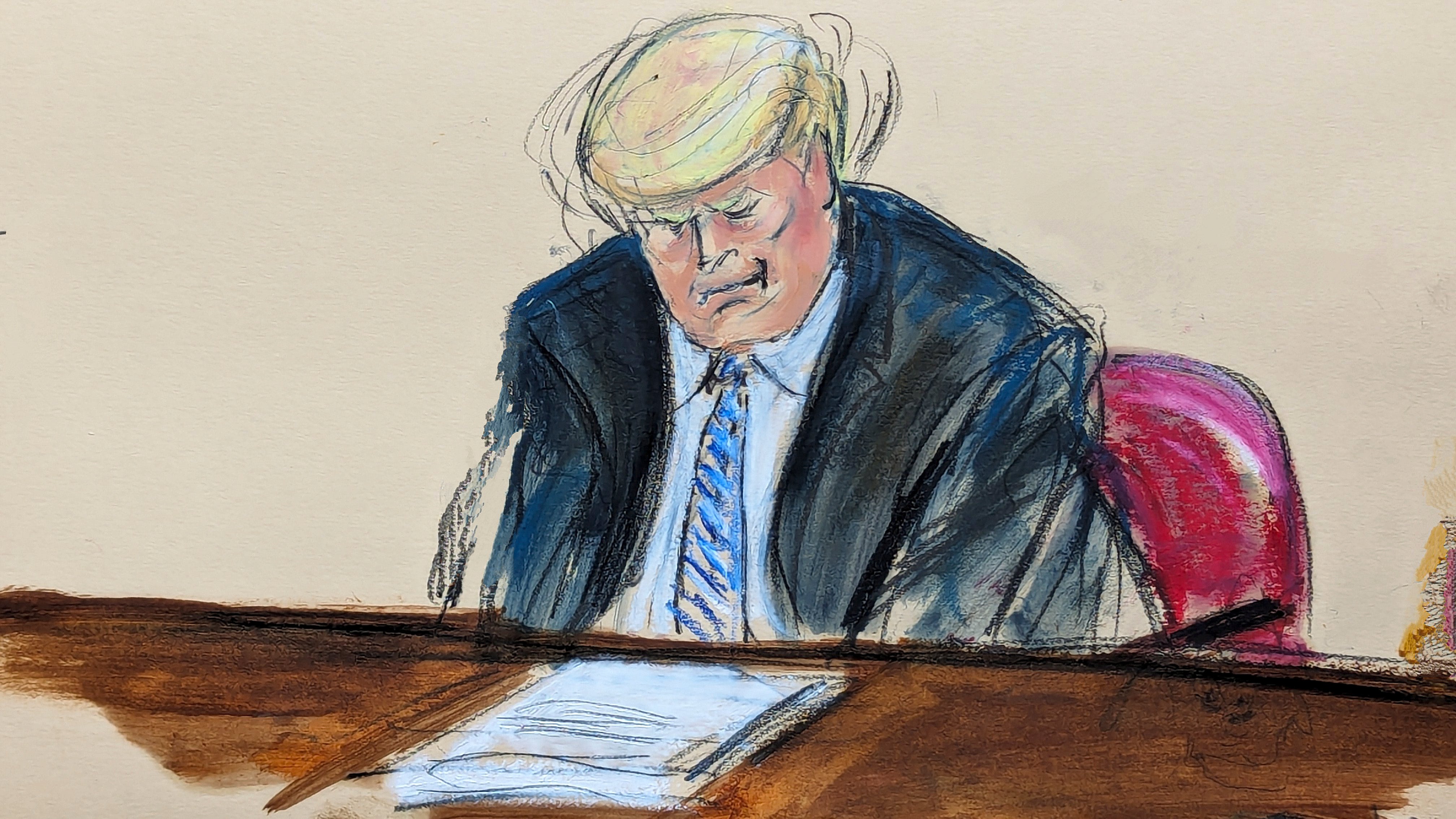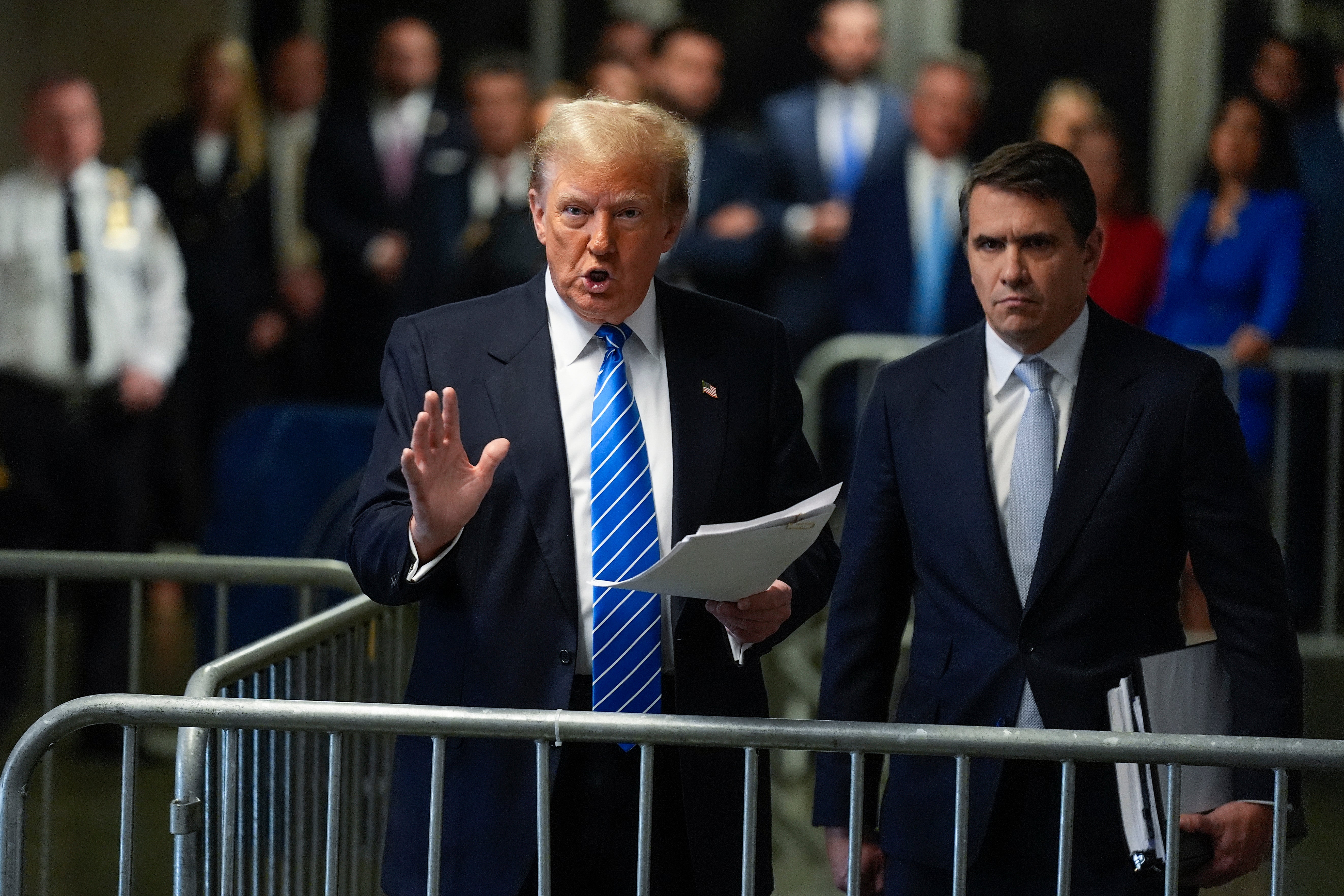Cohen says Trump told him to pay off Stormy Daniels. Key takeaways from day one of the fixer’s testimony
Michael Cohen remained calm on the stand as he testified about the catch-and-kill scheme, mislabeling the payments given to Stormy Daniels, and about Mr Trump’s reactions to explosive stories
Your support helps us to tell the story
From reproductive rights to climate change to Big Tech, The Independent is on the ground when the story is developing. Whether it's investigating the financials of Elon Musk's pro-Trump PAC or producing our latest documentary, 'The A Word', which shines a light on the American women fighting for reproductive rights, we know how important it is to parse out the facts from the messaging.
At such a critical moment in US history, we need reporters on the ground. Your donation allows us to keep sending journalists to speak to both sides of the story.
The Independent is trusted by Americans across the entire political spectrum. And unlike many other quality news outlets, we choose not to lock Americans out of our reporting and analysis with paywalls. We believe quality journalism should be available to everyone, paid for by those who can afford it.
Your support makes all the difference.Donald Trump’s former attorney and one-time “fixer” Michael Cohen has been looming throughout the former president’s criminal hush money trial in New York, on the lips of nearly every witness and all over documents at the heart of the case.
He made his debut on the witness stand on Monday, testifying for nearly six hours – giving jurors the crucial connective tissue for the prosecution’s case against Mr Trump.
It was Cohen who negotiated hush money deals that kept stories of Mr Trump’s alleged affairs away from voters. It was Cohen who wired $130,000 to Stormy Daniels. And it was Cohen who sent invoices to Mr Trump and was reimbursed for his payout to the adult film star.
On Monday, he testified that Mr Trump directed him to pay Ms Daniels in the hopes of keeping his chances of winning the 2016 presidential election alive, following a series of explosive controversies involving women that threatened to derail his campaign.
Cohen has now directly linked Mr Trump to the alleged cover-up, labelling his reimbursements as “legal expenses” when they were actually, as Cohen testified, made to buy the life rights to Ms Daniels’ story.
Here are the key takeaways from Mr Trump’s day in court:
Trump’s reaction to the Stormy Daniels story: ‘This is a disaster’
Mr Trump was furious with his attorney and feared “disaster” for his 2016 campaign when Cohen disclosed that Ms Daniels was preparing to share her story about having sex with him in 2006.
“I thought you had this under control. I thought you took care of this,” Cohen said, recalling Mr Trump’s enraged reaction to news that the adult film star’s allegations had resurfaced.
“Just take care of it. There’s a lot going on at the campaign at the time. Just take care of it,” Mr Trump said, according to Cohen.
“This is a disaster. This is a total disaster,” he said. “Women are going to hate me. This really is a disaster. Women are going to hate me. Guys will think it’s cool, but this is a disaster for the campaign.”
Melania came up with minimizing Trump’s ‘Access Hollywood’ comments as ‘locker room talk’
Mr Trump’s campaign was in “damage control” mode with the release of a tape from 2005 that included Mr Trump bragging about grabbing women’s genitals.
He told Cohen and his advisers that the campaign “needed to put a spin on this,” according to Cohen.
“And the spin that he wanted to put on it was that this was ‘locker room talk,’ something that Melania had recommended, or that’s what Melania thought it was,” he said.
He urged his campaign to “get control on the story and minimize impact on his campaign,” according to Cohen.

Trump was worried about losing women voters
Cohen was tasked with putting out fires from a series of damaging stories in the weeks leading up to the 2016 election, he said. He also told the court about how Mr Trump responded to such stories — and his concern about how those stories would play with women voters.
After hearing about the Access Hollywood tape, Cohen recalled thinking “This was going to be significantly impactful, especially with women voters.”
“At the time, Trump was polling very poorly with women,” he said. “With this Access Hollywood, he thought it was a disaster.” Cohen recalled Trump ordering him to “get control of it.”
This concern reappeared in early October when the threat of the Stormy Daniels story resurfaced after Cohen and Mr Trump thought they had buried the story in 2011 when the story of the alleged sexual encounter first appeared on the gossip website TheDirty.com.
Cohen recalled Mr Trump being “very angry” that the story resurfaced, adding: “I thought you had this under control. I thought you took care of this.”
“This is a disaster. Women are going to hate me. Guys will think it’s cool but this is a disaster for the campaign,” Mr Trump said, according to Cohen.
But the negative stories about Mr Trump threatening to repel women voters didn’t end there.
Cohen testified that when he discovered the Wall Street Journal was working on a story about the National Enquirer covering up allegations from Karen McDougal, who alleged a months-long affair with Mr Trump, Cohen contacted her attorney Keith Davidson as well as Trump aide Hope Hicks and publisher David Pecker “so we can all coalesce around this issue and again quell the effects of an article like this.”
Mr Trump then called Cohen, who said that they addressed that “this was a real serious problem, especially because it was so close to the election.”
He was angry and upset, Cohen recalled, “because there was a negative story that could once again impact the campaign as a result of women.”
Cohen portrays himself as a fierce, but calm, loyalist
Trump’s former attorney remained composed throughout his testimony — contrasting other witnesses’ opinions of his personality. In court, other witnesses have described him as a “pants-on-fire type of guy,” excitable, and “aggressive,” while outside of the courtroom, he often posts inflammatory tweets about Mr Trump.
Text messages shown in court also reflected that Cohen often worked with urgency, contacting many people to deal with the Trump issue du jour.
But on the stand, jurors didn’t see that personality at all. He remained cool, calm and collected, even when he was testifying about touchy subjects.
Earlier this month, Mr Davidson testified that after he found out that Mr Trump wasn’t considering offering Cohen a top position in the White House, “I thought he was going to kill himself.”
But in court on Monday, Cohen remained largely unfazed. He agreed with the prosecutor when she asked whether he was “disappointed.”
He also testified that despite his loyalty, his Christmas bonus was significantly cut in 2016.

Cohen said he felt “personally hurt” and “didn’t understand it” after “all I had gone through in terms of the campaign and laying out $130,000” on his behalf to protect Mr Trump. “It was insulting that the gratitude shown back to me was to cut my bonus by two-thirds,” he said.
He even joked emphatically: “I am unusually angry.” But even that line landed with a smile on the stand.
As for lying, Cohen admitted on the stand multiple times that his invoices were intentionally falsely labelled as a “retainer” when they were actually payments for the life rights of others’ stories.
‘Push it as long as you can’: Cohen confirms Trump wanted to stall until after the election
Prosecutors asked Cohen about his “strategy” to deal with the resurfaced Stormy Daniels story in October 2016.
Cohen recalled Mr Trump telling him to “push it out as long as you can.”
“If I win, it won’t matter,” he said, according to Cohen.
Mr Davidson said that his client had “expressed dissatisfaction with a delay of 10 days for funding,” which was written into the contract.
Cohen said that Mr Davidson “wanted an immediate wire transfer” and Cohen replied that he needed 10 days. He told the court that the 10-delay was “what I was instructed to do.”
“‘Push it past Election Day.’ I was following directions,” he said.
The deadline for paying Ms Daniels was 14 October, 2016.
Assistant District Attorney Susan Hoffinger asked Cohen whether he expected to make the payment on deadline.
“No ma’am,” Cohen replied. When asked what he was planning to do, he said: “Delay it.”
Trump never uses email
Cohen testified that his former boss did not have an email address.
During some conversations, Mr Trump “would comment that emails were like written papers,” according to Cohen
“He knows too many people who have gone down as a direct result of having emails that prosecutors can use in a case,” he added.
Cohen then confirmed that by “going down,” he meant “getting in trouble.”
‘Be prepared, there’s going to be a lot of women coming forward’
Before he launched his 2016 presidential campaign, Mr Trump warned Cohen – who was then the Trump Organization’s special counsel – that damaging stories about his relationships with women were imminent and could derail his bid for the White House, according to testimony from Cohen.
“You know, that when this comes out – meaning, the announcement – just be prepared there’s gonna be a lot of women coming forward,” Cohen said, remembering what his former boss told him in 2015.
Mr Trump wanted to rely on the “power” of the National Enquirer and its placement in “supermarkets and bodegas” to place “positive stories” about him and “negative” ones about his rivals, according to Cohen.
During a meeting at Trump Tower in August 2015, two months after the launch of his campaign. Mr Trump met with Cohen and tabloid publisher David Pecker, who previously testified that he vowed to be the “eyes and ears” of the campaign.

“What he said was that he could keep an eye out for anything negative about Mr Trump and that he would be able to help us know in advance about what was coming out for us to stop it from coming out,” according to Cohen.
The resulting “catch and kill” scheme helped bury a bogus story about an alleged love child with a Trump Tower maid as well a story from Ms McDougal.
Cohen admitted he would lie and bully for Trump
Cohen testified that upon reflection, he felt “fantastic” working at the Trump Organization for 10 years. He divulged that he referred to Mr Trump as “boss.”
“I enjoyed working with my colleagues at the Trump Organization, the Trump children. It was a big family,” he said.
But “there were great times and several not great times,” he added.
Ms Hoffinger asked whether he had ever lied for Mr Trump.
“I did,” he said. “It was sometimes needed to accomplish a task.”
Cohen confirmed that he would also “bully” on behalf of Mr Trump: “The only thing that was on my mind was to accomplish a task to make him happy.”
Cohen calls to Trump in days before election
By late October, weeks before 2016 Election Day, Ms Daniels’ attorney Keith Davidson was running out of patience with Cohen’s excuses, and Ms Daniels was shopping the story to The Daily Mail, according to Cohen.
Cohen met with Mr Trump, whose “friends” and “very smart people” told him to just pay Ms Daniels, he said.
“It’s $130,000, you’re a billionaire, pay it, there’s no reason to keep this thing out there,” Cohen said, recalling the advice from Mr Trump’s circle.
“He expressed to me, ‘Do it, meet with Allen Weisselberg and figure this out.’”
Mr Trump, Cohen and Weisselberg met at Trump Tower in January 2017, where then-president-elect Trump approved a payment plan that included reimbursements to Cohen over 12 months.
Mr Trump told them they were in for “one heck of a ride” in Washington, DC.
That amounted to $420,000 total spread out over 12 months – but it was not a retainer for future legal counsel, Cohen said.
It was a payment plan to cover up reimbursements, according to Cohen.
Weisselberg’s separation agreement from the Trump Organization won’t be in evidence
Judge Merchan is denying the admission of Allen Weisselberg’s separation agreement from the Trump Organization, which came up last week when prosecutors wanted to explain to the jury why a prominent figure in the case is not there.
Not only is he in Rikers Island jail, but the agreement effectively stipulates that he can’t speak out against the company in any way – without risking tens of thousands of dollars in severance.

On Friday, Judge Merchan suggested that Weisselberg could be brought up as a witness, though neither side has subpoenaed him.
The judge suggested he could be brought up, sworn in and questioned without a jury present first.
Trump cared more about his campaign than Melania, Cohen says
After the Access Hollywood tape was released, Cohen testified that Mr Trump feared how the offensive recording would affect his campaign — not his wife.
Cohen testified that he was strategizing with Mr Pecker about how to deal with the explosive story.
“He wasn’t thinking about Melania. This was all about the campaign,” Cohen said on the stand.
It’s the fifth week of the Manhattan criminal trial and Melania Trump is still nowhere to be seen.